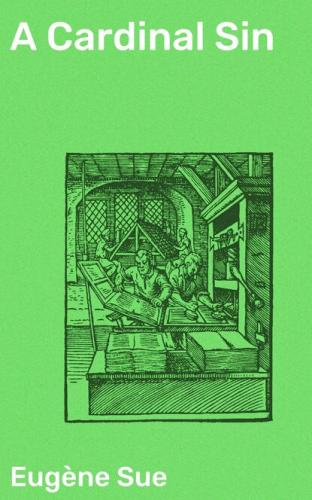Eugène Sue
A Cardinal Sin
Published by Good Press, 2019
EAN 4064066147853
Table of Contents
CHAPTER II.
In the meantime, Mariette was hurrying homeward, somewhat uneasy at the thought of her long absence. Having reached that sad, gloomy street known as the Rue des Prêtres-Saint-Germain, she walked rapidly along until she came to the last dingy house facing the dark walls of the church, where she entered. Crossing an obscure passage, the girl ascended a rickety stairway, only dimly lighted from a small court-yard that resembled nothing more than a narrow well, and stopped at the door of the portière.
"Madame Justin," she said to the woman, who stood on the threshold, "have you been up to see if my godmother wanted anything?"
"I carried up her milk, Mademoiselle Mariette," replied the woman, "but she was in such a temper that she received me like a dog."
"We must take pity on her, Madame Justin; she suffers so much."
"Of course you always excuse her and suffer everything in silence, Mademoiselle Mariette. It shows your kind heart, but it does not alter the fact that your godmother is as wicked as a red mule. Poor child! you are doing your purgatory on earth; and if there is no Heaven, you will be well cheated."
"Good-bye, Madame Justin, I must go up now."
"Wait a moment, I have a letter for you."
"A letter!" cried Mariette, her cheeks flushing and her heart throbbing violently. "Is it from the provinces?"
"Yes; the postmark is from Dreux, and it costs her six sous. Here it is. The word 'Urgent' is written in one corner of the envelope."
The girl thrust the missive in her bosom; then drawing her purse, she took out her last ten-sou piece and paid the woman. Taking her key, she then ran up the last stairs, her heart beating wildly with a sensation of mingled happiness and sadness. Though she was happy in the possession of the letter, the word "Urgent" on the corner of the envelope filled her with misgivings; besides, what sadness filled her heart at the thought that perhaps several hours must elapse before she could learn what Louis Richard had written.
Having finally reached the fifth floor of the dilapidated house, so gloomy and ill-smelling, with its atmosphere poisoned by stagnant water in the defective sinks and sewers, she hesitatingly entered the dingy room occupied by her godmother and herself.
A woman was lying with her face to the wall, on the only bed that the room boasted; while the thin mattress that served Mariette as a couch was rolled in a corner, as much out of the way as possible. A work table, an old dresser, two chairs, and a few kitchen utensils hanging around the chimney, composed the sole furniture of this humble home, lighted only by a narrow window overlooking the gloomy yard, but the most rigorous neatness was remarkable everywhere.
The girl's godmother, Madame Lacombe, was a tall, gaunt woman of fifty years, with a cadaverous complexion and harsh, disagreeable features. A bitter, sardonic smile, caused by a lifetime of misery and suffering, habitually contracted her livid lips, her form being almost bent double; her mutilated arm and bilious face, enframed in a ragged cap, through which hung long wisps of gray hair, were alone visible outside the coverings.
"Where have you been?" she cried, in a rasping voice, making an effort to tarn in her bed as the girl entered.
"Dear godmother, I—" began Mariette.
"Oh, yes; you go running about the streets, leaving me here alone to fret and fume!" interrupted the woman furiously.
"But I was scarcely gone an hour," protested the girl.
"And you hoped to find me dead on your return, eh?"
"Heavens! how can you think such a thing!" sobbed Mariette.
"Oh! yes; you may whine now. But I am not your dupe! You have had enough of me; and the day when I am screwed down in my coffin will be a day of rejoicing for you—and so will it be for me, too—Oh! my God! this is too much agony," she groaned, pressing her thin hand to her breast.
Mariette wiped away the tears drawn by this harsh sarcasm, and approaching the bed, said sweetly: "You had such a bad night that I thought you might sleep a little in my absence."
"Oh! yes—you leave me here alone, to die like a dog, while you run about the streets."
"I was obliged to go out; but Madame Justin promised—"
"I had rather see death itself than that creature," interrupted the sick woman angrily, "and you take every opportunity to send her to me."
A bitter smile flitted over the girl's lips; but she passed this new sarcasm unnoticed and said gently: "Shall I put fresh bandages
